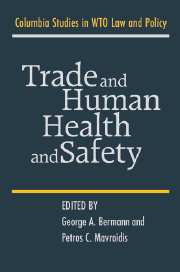Book contents
- Frontmatter
- Contents
- Preface to the Series
- Introductory Remarks
- 1 A Map of the World Trade Organization Law of Domestic Regulation of Goods
- 2 The WTO Impact on Internal Regulations: A Case Study of the Canada–EC Asbestos Dispute
- 3 Reflections on the Appellate Body Decision in the Hormones Case and the Meaning of the SPS Agreement
- 4 The Salmon Case: Evolution of Balancing Mechanisms for Non-Trade Values in WTO
- 5 Lotus Eaters: Reflections on the Varietals Dispute, the SPS Agreement and WTO Dispute Resolution
- 6 Regulatory Purpose and “Like Products” in Article III:4 of the GATT (with Additional Remarks on Article III:2)
- 7 The WTO Standard of Review in Health and Safety Disputes
- 8 Expert Advice in WTO Dispute Settlement
- 9 Domestic Regulation, Sovereignty and Scientific Evidence Requirements: A Pessimistic View
- 10 Time for a United Nations' “Global Compact” for Integrating Human Rights into the Law of Worldwide Organizations: Lessons from European Integration Law for Global Integration Law
- Index
- References
Introductory Remarks
Published online by Cambridge University Press: 27 July 2009
- Frontmatter
- Contents
- Preface to the Series
- Introductory Remarks
- 1 A Map of the World Trade Organization Law of Domestic Regulation of Goods
- 2 The WTO Impact on Internal Regulations: A Case Study of the Canada–EC Asbestos Dispute
- 3 Reflections on the Appellate Body Decision in the Hormones Case and the Meaning of the SPS Agreement
- 4 The Salmon Case: Evolution of Balancing Mechanisms for Non-Trade Values in WTO
- 5 Lotus Eaters: Reflections on the Varietals Dispute, the SPS Agreement and WTO Dispute Resolution
- 6 Regulatory Purpose and “Like Products” in Article III:4 of the GATT (with Additional Remarks on Article III:2)
- 7 The WTO Standard of Review in Health and Safety Disputes
- 8 Expert Advice in WTO Dispute Settlement
- 9 Domestic Regulation, Sovereignty and Scientific Evidence Requirements: A Pessimistic View
- 10 Time for a United Nations' “Global Compact” for Integrating Human Rights into the Law of Worldwide Organizations: Lessons from European Integration Law for Global Integration Law
- Index
- References
Summary
The Issue
In this volume, we aim to present a comprehensive discussion of the constraints that the WTO agreement imposes on national health policies. The primary WTO texts, to some extent, address this question, and there are by now a number of cases that have dealt with the issue. Health policies are of course domestic policies which may be enforced, either internally or at the border, based on efficiency criteria. There is nothing like a world health policy, that is, some sort of transfer of sovereignty to the world plane to this effect. Cooperation at the world level takes place among governments, usually under the auspices of the WHO (World Health Organization). However, there is evidence, in recent years, of substantial cooperation on this front through non-governmental organizations as well.
Of special interest in this volume is the “conflict” between health policies and trade liberalization. In principle, anything can affect trade flows, health-based measures included. However, it would be unreasonable for governments to enter into contractual arrangements with other governments by which, in the name of trade liberalization, they agree to succumb and expose their populations to health externalities.
The WTO Agreement regulates the interplay between trade and health in various places. The GATS (the General Agreement on Trade in Services) is not immune to such concerns either. Safety regulations in the supply of services can largely affect the supply as such and their trade component as well. This relationship, however, is not the exclusive concern of primary WTO law.
- Type
- Chapter
- Information
- Trade and Human Health and Safety , pp. 1 - 8Publisher: Cambridge University PressPrint publication year: 2006



